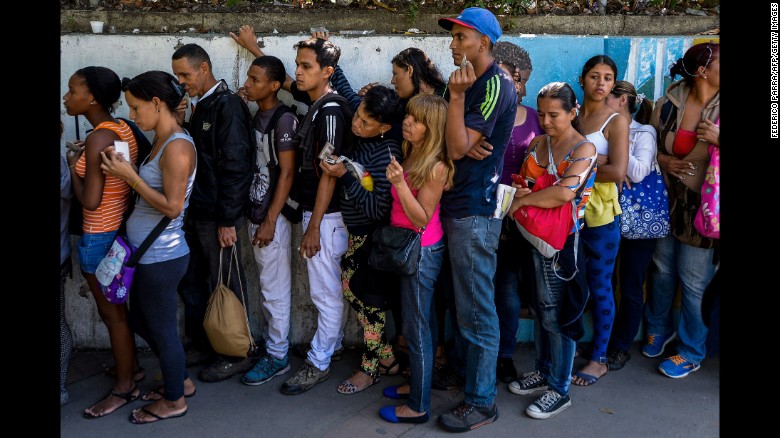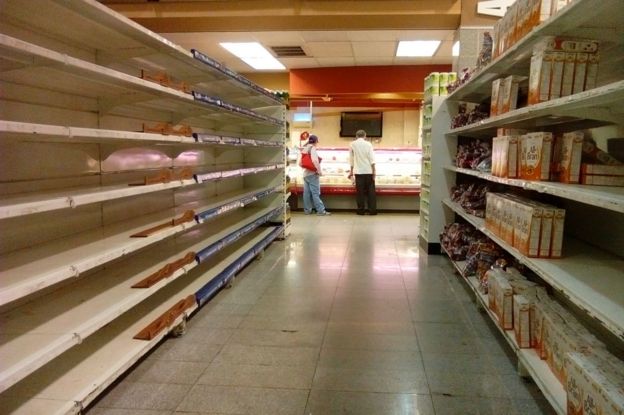Venezuela's Food Chaos
"We're going to distribute bread at a much cheaper price and in larger quantities than before."
"It's no longer going to be about the exploited and exploiter, no more boss and chief. We're all going to become productive, living and producing in equality."
Venezuelan Vice-President Tareck El Aissami
"Seeing all this makes me want to cry."
"I want to eat a sweet roll but there aren't any and what products exist are too expensive. I guess I'll have to settle for a coffee."
Antonio Medina, 77, retiree, eastern Caracas
"What I have at home is enough to give them [her children] a plain arepa [traditional white corn cake], and it's very little for each one."
"And for me, I don't care about going without eating. As a mother you're always thinking about feeding [your children]."
Grecia Gonzalez, Caracas, Venezuela
 |
| People line up to buy basic food and household items outside a supermarket in Caracas, on September 28, 2016. CNN |
Venezuelans now report that they have taken to skipping meals and when they do eat, they eat less. A recent survey had respondents reporting that they now eat two or fewer meals every day. The number has tripled from a similar survey undertaken the year before when in 2015, 11.3 percent reported eating less, and in 2015 that number had risen to 32.5 percent cutting out meals. The authors of the study, using the collected data, estimated that 9.6-million Venezuelans eat two or fewer daily meals.
The result of which is that malnutrition is on a steady rise.
The government of Venezuela must import much of the food supply for its population, where once agriculture provided the nation with much of the food they needed. The agrarian revolution that accompanied the Bolivarian Revolution of Hugo Chavez had laid desolate a once-thriving economy, and a country that has oil riches failed to reinvest in infrastructure and updated refineries. Taking as its model the Communist Manifesto, the failures that were seen in revolutionary socialism in Russia have been replicated in Venezuela.
 |
| Boxes of bran cereal were available in this Caracas supermarket in June Getty Images |
The government has taken to invading bakeries, coopting them from their owners to turn control over to neighbourhood committees sympathetic to the government, who are then expected to bake bread from the government-distributed bags of imported flour. Bread, under these new arrangements, is theoretically supposed to be ready for sale at the crack of dawn in a "bread war" enforcing price controls where a loaf sells for roughly 28 cents and less than ten cents on the black market.
Bakeries that presume to try to bake unauthorized types of luxury breads to sell at higher prices in an effort to earn a modest profit are subjected to spot checks by government agents visiting around 700 bakeries, and if deviation from the government-ordered production schedule is detected, those responsible are arrested. Two people were arrested for producing brownies instead of bread, for sale, to people willing to pay slightly more for food items out of the ordinary.
Where fresh milk and regular rice are regulated to be available to the public, fancy yogurts and precooked rice have made their discreet appearance at higher cost, provoking government rage, since such specialty products are out of the financial reach of most Venezuelans and protests by hungry people are not popular with government sensitivity. Bakeries were recently ordered to set aside 90 percent of the flour they are apportioned for the production of French bread and a European style of baguette popular with Venezuelans called "canilla".
The price controls that President Nicolas Maduro inherited from his predecessor, Hugo Chavez, who introduced them to hurt businesses owned by political opponents of his regime who attempted a national strike to force him from office, are seen to have initiated the failure of Venezuelan industries. The government, with its lower revenues with the collapse of oil prices, is incapable of importing as much food as the country requires to keep the population hale.
Representatives of the baking industry accuse the government of importing a quarter of the 120,000 metric tons of what the nation's ten thousand bakeries require monthly to keep pace with demand from hungry Venezuelans.
Labels: Economy, Social Dysfunction, Venezuela

<< Home